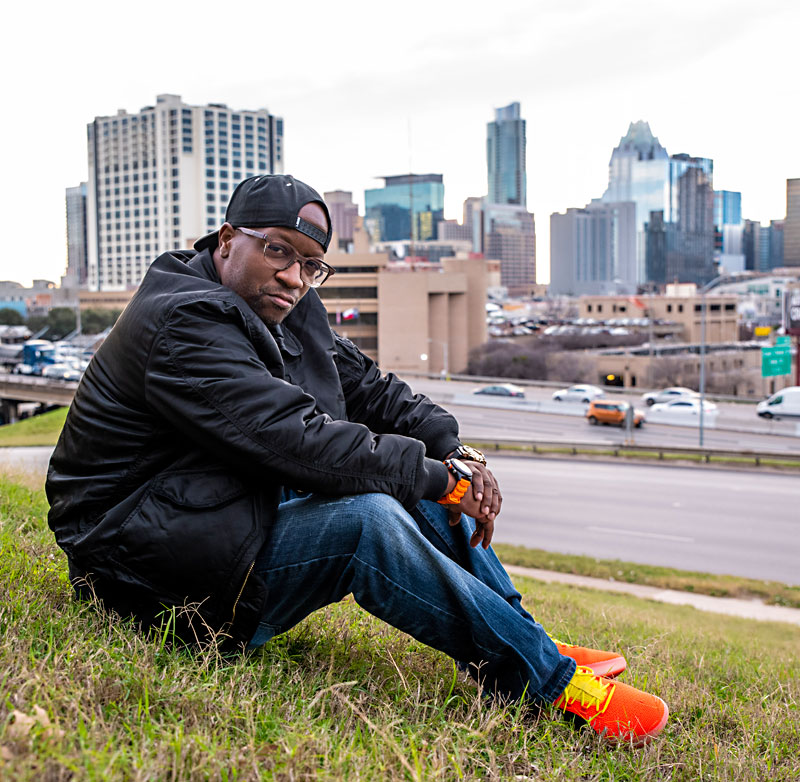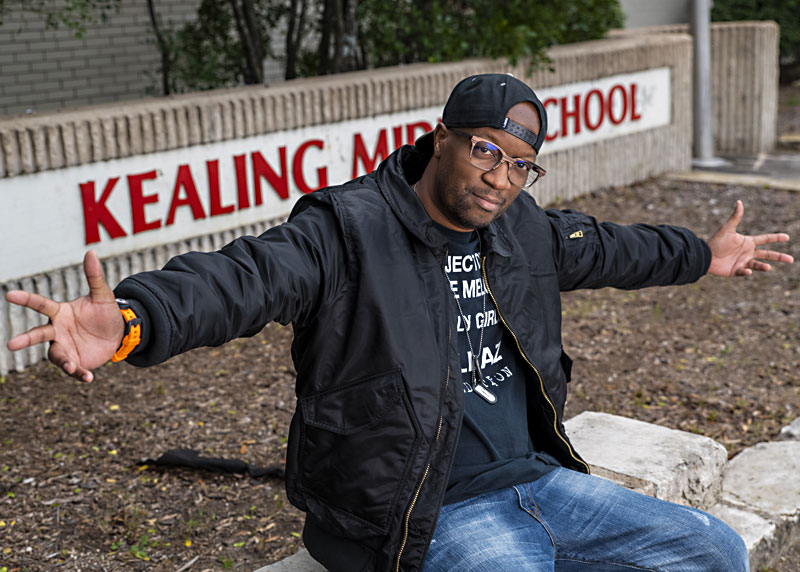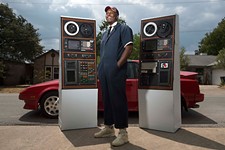Austin Hip-Hop Pioneer Tee Double Perseveres
Holding the vision through institutional racism, isolation, and a double transplant
By Kahron Spearman, Fri., Feb. 12, 2021
Terrany "Tee Double" Johnson doesn't square easily in any definitive light. The prolific 47-year-old "Kid from Kealing" remains Austin's most appropriate ambassador of a rich and burgeoning hip-hop culture, a thoroughly self-made embodiment of the scene's oft-tempered highs and forgettable, oft-racialized lows. And yet, short of his broad legacy, the genre's homegrown community arrives at no particular consensus on Johnson.
Rapper of over 30 almost-exclusively self-produced full-lengths, including 1999's Lost Scriptures on Good Vibe Recordings and 2000's Texas Resident, and chief mentor for his Urban Artist Alliance incubator, he discusses Austin's contemporary rap crop with a certain degree of generational guilt.
"My generation of MCs, we dropped the ball because we didn't bring in a lot of the younger cats," he concedes on Zoom in late January. "It should never be old versus young. It should be, 'We're in the same boat,' as far as being artists, being hip-hop, being the culture."
Johnson experienced tough love early in his career, from an overlapping generation that saw his potential but once told him, matter-of-factly, he wasn't good enough. He needed to do more, be more, be all things for himself, be dependent on few, if any. As a former know-it-all, "hothead MC," he stood on the shoulders of local stalwarts including DJ Casanova and Nineties biggies Papa Chuk and MC Overlord.
"When I was under [Austin Music Hall of Famer] Casanova and Andre Walker, there was no coddling," says Johnson. "It wasn't like, 'You'll be okay, Tee. Don't worry about it.' It was like, 'That shit's garbage. Rewrite that. Make that hook tighter.'"
"He submitted a couple of times for South by Southwest," remembers Walker, who booked hip-hop acts for the festival 1994-96. "I told him, 'Dude, you know, you gotta understand, we got major labels coming. We got different people, magazines, and [the music] just isn't there.'
"He never took it as a diss, not once."
Instead, the industrious Johnson learned more and became more. Because of Austin's ongoing lack of infrastructure for nonwhite artistry, his DIY methodology built an involuntary insularity. He retreated to his studio fortress of solitude, TeeTopia, as he concluded no one was coming to help.
Remarkably, that hell-or-high-water perseverance still holds steadfast to his original vision, blurred as it's become by forces outside of his control.
Flip, Flip, Flip
"Music grabbed me when I was maybe 7 or 8 at Maplewood Elementary. I was one of those kids that couldn't play during recess because I would have asthma attacks. I wasn't into sports heavy, football or basketball. Music became my main thing because I was a sickly child.
"I'm still sickly," admits Johnson with a chuckle.
Born May 17, 1973, at Brackenridge Hospital to Mack and Rosie Johnson, a recently retired schoolteacher, Terrany grew up initially as "Roderick's little brother."
"He was good in sports, football, track, and that was his thing," says the rapper. "Music was the way for me to make my own identity."
Fortunately, he enjoyed the necessary support at home. In this, his older sibling proved functionally crucial. Inspired by Sugar Hill Records, Grandmaster Flash, and later LL Cool J, Kool G Rap, and the legendary Juice Crew, young Terrany filled notebooks with rhymes while figuring out how to make his own records.
"I went to my mom and was like, 'I don't want a football, I don't want a basketball,'" he recalls. "I said, 'I want a keyboard and a recorder, a boombox.' That's when I first recorded my songs, on a dual-cassette, because I could record on one, send it to the other one, add some more music, flip, flip, flip."
Johnson's extraordinary ability to freestyle stems from early ciphers in the "courtyard" of Kealing Junior High during the mid-Eighties. He'd run down on competitors alongside fellow native Charles "Chilly Red" Edwards. The latter states that Johnson, ever resourceful, figured out how to make early rap's trademark scratch sonics with a cassette player by manipulating its reels and pause button.
Mixtape Material
Timing, lineage, and the sociopolitical temperature within the state capital's hip-hop scene are essential to understanding Johnson. Before the late MC Overlord (Donell Robinson) infiltrated Sixth Street during the mid-Nineties, rap found itself confined to East Austin on an exclusively racial basis. DJ Casanova (Ashton Irons) said performances took place "mostly at Doris Miller [Auditorium], at Givens Park, at the gyms, or the skating rink."
Under Irons, Johnson learned self-reliance. The former counted membership in Project Crew, which released Austin's first authentic vinyl hip-hop release in 1988, a 12-inch that included the popular "Army Man." The two met when Johnson, as Tee Double, ran with the short-lived outfit Dope Melody. DJ Casanova's studio became Tee Double's proving ground.
"I'm like, 'If you're an MC, you need to be self-sufficient if you want to keep going,'" affirms the DJ. "'That way, you're not waiting around for someone to give you a beat or do something for you.'"
Along with Overlord's then-controversial acoustic/funk-influenced turn in West Austin, the ascendance of Papa Chuk (Charles Roberts) proved seminal as Austin's first major-label rap artist, who released 1994's The Badlands through Pendulum/EMI. In an interview that same year with British monthly Hip Hop Connection, Roberts blamed his leaving Austin for Houston on the local seat of government having proved "syndicated, segregated, political."
Using South by Southwest as a vehicle, hip-hop took root in Austin through the pioneering work of Walker, Kier Worthy, Matt Sonzala, and Johnson himself. Finding a foothold on Sixth Street at the Mercury, Hip Hop Humpday, featuring DJ Phyfteen and a legendary live band that included multi-instrumental phenom D-Madness, represented arguably the city's high point as a roving, open-mic "Lyricist Lounge." Johnson sharpened his skills there alongside Bavu Blakes, Mirage the Gr8 (Dana Thompson), and Traygod (Tray Frazier).
From this launch, Johnson went on to win virtually every rap-related award one can collect in this town. Both his Urban Artist Alliance and Kinetic Global Media push his catalog publishing and licensing. Aside from the Casanova-produced "Mixtape Material" off the Good Vibe release, Johnson produced every single track in his 33-album catalog.
"I always hated sitting in the studio with [a producer], where they're fiddling around, not creating what I'm hearing in my head," he shrugs.
Finding fresh creativity within an echo chamber generally proves a challenge. Moreover, one can't help but wonder if Johnson carried the ownership of himself to great extremes. Perhaps the studio remains one place he maintains control over his life.
Insulin & Ice Cream
"My body shut down, where I couldn't walk, couldn't go upstairs," reveals Johnson.
Like some 10% of Americans, the Austinite suffers from diabetes, type 1, a chronic disorder causing the body's immune system to mistakenly destroy insulin-producing cells in the pancreas. For half of his adult life, the condition meant self-administering insulin shots, sometimes three or four times a day. Then, in February 2019, his kidneys and pancreas shut down completely.
"The doctors were like, 'Yo, your kidneys are done,'" he remembers, citing similar episodes previously. "It went to the point where they were like, 'You might not make it to tomorrow; call your family. Do we need to call a preacher?'"
Blood saturated with toxins, he underwent three blood transfusions. They installed a chest catheter through which he took dialysis.
"You instantly think, 'I got six months to live,'" he says. "You're checking your mortality: 'Okay, am I going to survive? Am I going to live?' You read all these reports saying some people don't make it a year; some make it five years. You just don't know.
"Now you're getting needles stuck in your arm, three times a week for four hours in the morning. I would go to dialysis at, like, 5am and get out around 9. My mom would pick me up, because sometimes I got out I was weak. I would go home, rest for about an hour, then I'd go up to the studio because my thought was, 'If I'm going through dialysis, I don't know how much time I have left.'"
After an administrator assisted his efforts to get onto transplant lists, a foot injury caused by diabetes made him ineligible.
"When that healed up, I called back on a Thursday to be put back onto the list," he details. "The following Tuesday, they called me with the kidney and the pancreas."
Just two days later, "life hit reset."
So far – some three months down the road – his body makes nice with its substitute organs. No longer is he taking 40 pills daily to prevent rejection. For now, he's regained some semblance of equilibrium.
"You still got to eat a certain way, but [I can] eat ice cream without worrying about my blood sugar being so high," he smiles. "It's a complete blessing."
Considering his prior medical history and the time limit affixed to his improved condition, Johnson's solitary existence explains itself. What would have his peers understood about the tenuous nature of his life, day-to-day, year after year? How could they have put themselves into his shoes? Who can truly meet him where he is, where he's been?
"It's hard," agrees Johnson. "I'm already an introvert, and the illnesses have added to that over the years. It's hard to explain the depth of everything, the perceptions. People usually think kidney transplants are an 'old folks' thing.
"But it's forced me to slow down, mellow out. I mean, it was the first time I've slowed down since I was 7-8 years old. That's a long time to be moving nonstop."
Superstar
Terrany Johnson is a hard man to square, but he's done the best he knew how with an imperfect city, mentors, and tools provided to him. He's powered through even when his body, "said 'fuck you' and did its thing," attempting to halt the progress of his life. While not absolving any faults, his virtues intensify a resolute greatness.
Survival, by definition, is success.
Longtime producer and children's media artist, Jan Bozarth first met 16-year-old Johnson through American YouthWorks, an educational nonprofit serving youth and young adults. Today, the latter calls her his "second mother."
"I was asked to create a program using music to help get young people aged 16-26, who had kind of lost their way, redirected back to school," explains Bozarth of a curriculum creating music and outlining fundamentals of the music business. "He was one of the only kids in the program that was still in school. He was the superstar."
Through the phone, she's audibly emotional. "We had sayings in the class that we used to try to unify ourselves and stay on our paths," she continues. "One of those things was to 'hold the vision.' It sounds really simple in terms of when you have a creative vision, but you don't know when you're 17 that you're going to go through a lot of stages, a lot of shit.
"To hold a vision for that many years is a big deal, right?"
5 Tee Double Ciphers
"Lost Scriptures" (from 1999's Lost Scriptures)
"This track was my first true national single."
"20 Manor Road" (from 2001's The Eighth Principle)
"It's a narrative of me thinking back when I was younger, riding that bus route to school, and work, and around Austin."
"Bringing It Back" (from 2005's The Growth)
"It was my first big sync for Breaking Bad."
"Feel the Vibe" (from 2004's The Lone Star LP)
"That's one that we did live with a full band during my Boombox ATX residency at Lucky Lounge. A cool James Brown funk groove."
"Black Fist Solid" (from 2016's Black Mics Matter)
"This is special because this project featured tons of local artists and poets. It's social commentary not many were doing locally at the time."















